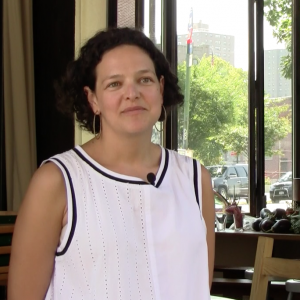 Naama Tamir owns the Lighthouse Restaurant in South Williamsburg, Brooklyn with her brother. They opened the restaurant four years ago to serve as a beacon—to bring people together for healthy, delicious food in a community atmosphere. One of the things that Naama most appreciates about living and working in Brooklyn is the sense of community, and she runs her business with eye towards giving back to the community.
Naama Tamir owns the Lighthouse Restaurant in South Williamsburg, Brooklyn with her brother. They opened the restaurant four years ago to serve as a beacon—to bring people together for healthy, delicious food in a community atmosphere. One of the things that Naama most appreciates about living and working in Brooklyn is the sense of community, and she runs her business with eye towards giving back to the community.
“We try to do things a little differently,” explains Naama. “We do our best to separate our organic waste and send at least some of it to local community gardens and parks. Oyster shells are collected for the Billion Oyster project. As for glass and cardboard, we separate them, but in all honesty, I don’t know if they get recycled. There is very little transparency in the carting business. I would like to change that.”
Naama would like to know that her recyclables are actually being recycled, and she would like her hauler to offer composing services. Currently, most waste haulers don’t offer recycling or composting services for small businesses. Although they are required to audit how much waste and recycling they are picking up from businesses, they rarely do this or share the results with their customers. Environmentally-conscious businesses still practice recycling, but do not benefit from discounts on their bill for recycling.
Naama believes that part of the problem is that people try not to think about waste, even though it affects their lives in a huge way and is a growing problem. “It’s about more than unpleasant odors or the cleanliness of our streets,” she says. “It impacts our children—increasing the chance of asthma because of the truck traffic. Our children’s future is stolen when all the materials that we could be reusing, recycling and upcycling get dumped.”
She would like to see a change in the way materials are produced and disposed of, so the city approaches a more sustainable, zero waste economy. She explains, “It’s about connecting all the dots and building community. Restaurants and waste management and everyone can work together to change the way things are working. Small businesses are what make New York’s neighborhoods unique. We can improve quality of life and make a real difference in the world.”